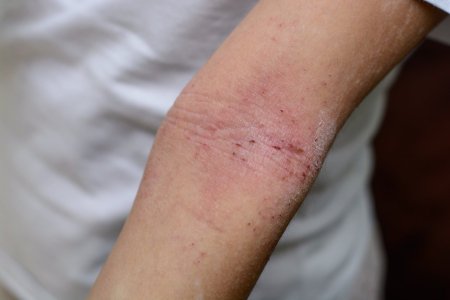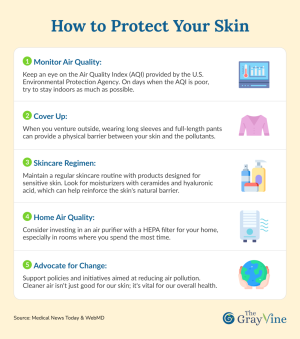Breathe safer: How everyday air pollution could be triggering a certain skin condition!
- Replies 0
Disclaimer: The information provided in this article is for educational purposes only and is not intended as a substitute for professional medical advice, diagnosis, or treatment. Always consult your physician or other qualified healthcare providers with any questions you may have regarding a medical condition or before making any changes to your health regimen.
In the bustling cities and industrial hubs that many of us call home, the air we breathe is often laced with a cocktail of pollutants. While we're aware of the impact this can have on our lungs and heart, there's a growing concern that's skin-deep—literally. The GrayVine is here to unpack these findings and offer insights into how you can protect your skin and breathe a little easier.
A recent study from the All of Us Research Program has shed light on a link that's particularly troubling for the senior community, many of whom are already grappling with sensitive skin issues: Air pollution might be exacerbating eczema.

The Skin You're In: Eczema and Air Pollution
Eczema, also known as atopic dermatitis, is more than just an occasional itch. For the 31 million Americans affected, it's a chronic battle against inflamed, dry, and itchy skin. The condition can be a source of discomfort and self-consciousness, and it often requires a careful skincare routine to manage.
The study, published in the journal PLOS ONE, suggests that living in areas with higher levels of air pollution significantly increases the risk of eczema. Researchers, including Dr. Jeffrey Cohen from Yale School of Medicine, analyzed data from the National Institutes of Health All of Us Research Program, focusing on the correlation between eczema cases and ZIP codes with high levels of fine particulate matter (PM2.5).
Fine Particulate Matter: A Tiny but Mighty Foe
PM2.5 refers to particulate matter that's less than 2.5 micrometers in diameter—about 3% the diameter of a human hair. These particles are so small that they can penetrate deep into the lungs and even enter the bloodstream. But their impact doesn't stop at internal organs; they can also compromise the skin's barrier function, which is crucial for those with eczema.
Protecting Your Skin
Eczema isn't just a local issue. Similar studies from Australia, Europe, and Asia echo these concerns, painting a picture of a global health challenge. With climate change fueling more intense wildfires and pollution levels, the frequency and severity of eczema flare-ups are on the rise.
So, what can you do to shield your skin from these invisible attackers? Here are some practical tips:
1. Monitor Air Quality: Keep an eye on the Air Quality Index (AQI) provided by the U.S. Environmental Protection Agency. On days when the AQI is poor, try to stay indoors as much as possible.
2. Cover Up: When you venture outside, wearing long sleeves and full-length pants can provide a physical barrier between your skin and the pollutants.
3. Skincare Regimen: Maintain a regular skincare routine with products designed for sensitive skin. Look for moisturizers with ceramides and hyaluronic acid, which can help reinforce the skin's natural barrier.
4. Home Air Quality: Consider investing in an air purifier with a HEPA filter for your home, especially in rooms where you spend the most time.
5. Advocate for Change: Support policies and initiatives aimed at reducing air pollution. Cleaner air isn't just good for our skin; it's vital for our overall health.
At The GrayVine, we believe in the power of community. By sharing this information and taking collective action, we can all contribute to a healthier environment and better skin health. Remember, while we can't control the air outside, we can take steps to minimize its impact on our health. Let's take action to breathe safer and live better, starting today.

Do you have any tips for managing eczema that you'd like to share with our community? Or perhaps you have questions about how to improve your home's air quality? Join the conversation in the comments below!
In the bustling cities and industrial hubs that many of us call home, the air we breathe is often laced with a cocktail of pollutants. While we're aware of the impact this can have on our lungs and heart, there's a growing concern that's skin-deep—literally. The GrayVine is here to unpack these findings and offer insights into how you can protect your skin and breathe a little easier.
A recent study from the All of Us Research Program has shed light on a link that's particularly troubling for the senior community, many of whom are already grappling with sensitive skin issues: Air pollution might be exacerbating eczema.

Living in areas with higher air pollution is associated with an increased risk of developing eczema, as suggested by a new study. Image source: National Eczema Society via Facebook.
The Skin You're In: Eczema and Air Pollution
Eczema, also known as atopic dermatitis, is more than just an occasional itch. For the 31 million Americans affected, it's a chronic battle against inflamed, dry, and itchy skin. The condition can be a source of discomfort and self-consciousness, and it often requires a careful skincare routine to manage.
The study, published in the journal PLOS ONE, suggests that living in areas with higher levels of air pollution significantly increases the risk of eczema. Researchers, including Dr. Jeffrey Cohen from Yale School of Medicine, analyzed data from the National Institutes of Health All of Us Research Program, focusing on the correlation between eczema cases and ZIP codes with high levels of fine particulate matter (PM2.5).
Fine Particulate Matter: A Tiny but Mighty Foe
PM2.5 refers to particulate matter that's less than 2.5 micrometers in diameter—about 3% the diameter of a human hair. These particles are so small that they can penetrate deep into the lungs and even enter the bloodstream. But their impact doesn't stop at internal organs; they can also compromise the skin's barrier function, which is crucial for those with eczema.
Protecting Your Skin
Eczema isn't just a local issue. Similar studies from Australia, Europe, and Asia echo these concerns, painting a picture of a global health challenge. With climate change fueling more intense wildfires and pollution levels, the frequency and severity of eczema flare-ups are on the rise.
So, what can you do to shield your skin from these invisible attackers? Here are some practical tips:
1. Monitor Air Quality: Keep an eye on the Air Quality Index (AQI) provided by the U.S. Environmental Protection Agency. On days when the AQI is poor, try to stay indoors as much as possible.
2. Cover Up: When you venture outside, wearing long sleeves and full-length pants can provide a physical barrier between your skin and the pollutants.
3. Skincare Regimen: Maintain a regular skincare routine with products designed for sensitive skin. Look for moisturizers with ceramides and hyaluronic acid, which can help reinforce the skin's natural barrier.
4. Home Air Quality: Consider investing in an air purifier with a HEPA filter for your home, especially in rooms where you spend the most time.
5. Advocate for Change: Support policies and initiatives aimed at reducing air pollution. Cleaner air isn't just good for our skin; it's vital for our overall health.
At The GrayVine, we believe in the power of community. By sharing this information and taking collective action, we can all contribute to a healthier environment and better skin health. Remember, while we can't control the air outside, we can take steps to minimize its impact on our health. Let's take action to breathe safer and live better, starting today.
Key Takeaways
- Living in areas with higher air pollution is associated with an increased risk of developing eczema, as suggested by a new study.
- Researchers identified a correlation between the residences of eczema patients and higher levels of fine particulate matter (PM2.5).
- The study, which used data from a large cohort of US adults, indicates that air pollution may impact the immune system, leading to eczema.
- Dermatologists recommend measures such as wearing protective clothing and limiting outdoor activities during high pollution levels to mitigate the effects of air pollutants on eczema.
Do you have any tips for managing eczema that you'd like to share with our community? Or perhaps you have questions about how to improve your home's air quality? Join the conversation in the comments below!
Attachments
Last edited:








